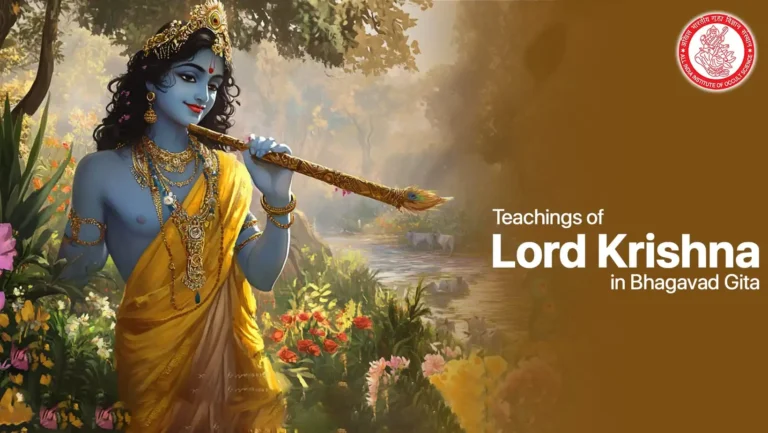Table of Contents
ToggleTeachings of Lord Krishna in Bhagavad Gita
The teachings of Lord Krishna in the Bhagavad Gita highlights the importance of duty (dharma), selfless action (karma yoga), devotion (bhakti), and knowledge (gyan). Krishna tells Arjuna to act with courage, without clinging to rewards. Live with honor, walk the righteous path.
Lord Krishna teachings include the soul never dies—bodies fade, but the spirit is eternal. Leave behind greed, pride, and craving. Love God with all your heart. Find peace in devotion. The Gita is a book for the lost, a call to live with purpose, strength, and truth.
This is the Bhagavad Gita. And these are the teachings of Lord Krishna in Bhagavad Gita—lessons for warriors, for thinkers, for anyone who walks the road of life.
Also Read: Basant Panchami Date
1. The Soul Never Dies
You are not your body. The body is dust, waiting to return to the earth. But the soul? The soul does not break. It does not burn. It does not fade. It moves from one life to another, like a traveler changing clothes.
This is the first truth Arjuna learned. He feared death. Krishna told him there is no death, only change. The wise do not mourn. They do their duty.
भगवद्गीता 2.20
“न जायते म्रियते वा कदाचिन्
नायं भूत्वा भविता वा न भूयः ।
अजो नित्यः शाश्वतोऽयं पुराणो
न हन्यते हन्यमाने शरीरे ॥”
Lesson: Do not fear what ends. Nothing truly ends.
2. Do Your Duty—Without Worrying About the Result
Arjuna did not want to fight. He saw war as destruction. Krishna told him otherwise. Dharma, the duty of a warrior, is to fight for justice. To run from duty is a weakness.
But here’s the trick—act, but do not attach yourself to the result. A farmer sows seeds, but he cannot force them to grow. A soldier fights, but he cannot decide the outcome of a war. Do your part. Leave the rest to God.
भगवद्गीता 2.47
“कर्मण्येवाधिकारस्ते मा फलेषु कदाचन ।
मा कर्मफलहेतुर्भूर्मा ते सङ्गोऽस्त्वकर्मणि ॥”
Lesson: Work hard, give your best—but do not cling to success or fear failure.
Also Read: Rudraksha beads
3. Desire is a Trap—Control It
Desires burn. They seem small at first. A little hunger. A little greed. A little craving. But soon, they grow. They turn to anger. Anger leads to confusion. Confusion blinds you.
Krishna warns—if you let desires control you, you lose yourself. Like a charioteer who lets go of the reins, you crash. But if you control your desires, you are steady. You are strong.
भगवद्गीता 3.37
“काम एष क्रोध एष रजोगुणसमुद्भवः ।
महाशनो महापाप्मा विद्ध्येनमिह वैरिणम् ॥”
Lesson: Own your mind. Do not let your cravings own you.
4. You Are Not the Doer—God Is
People believe they control their fate. Krishna laughs at this. You are not the doer. God is. He moves the world. He turns the wheel of time. He decides who rises, who falls.
A wise man acts, knowing this truth. He works without ego, without pride. He becomes an instrument of the divine.
भगवद्गीता 3.27
“प्रकृतेः क्रियमाणानि गुणैः कर्माणि सर्वशः ।
अहङ्कारविमूढात्मा कर्ताहमिति मन्यते ॥”
Lesson: Do your work with humility. Success is not yours alone.
5. Whenever Evil Rises, God Will Set It Right
The world moves in cycles. Sometimes, goodness prevails. Sometimes, darkness spreads. But always, when evil takes over, when justice is lost, God comes to restore balance.
Krishna tells Arjuna: “I come in every age. I take form to protect the good and destroy the wicked.”
भगवद्गीता 4.7-8
“यदा यदा हि धर्मस्य ग्लानिर्भवति भारत ।
अभ्युत्थानमधर्मस्य तदात्मानं सृजाम्यहम् ॥ ४.७ ॥
परित्राणाय साधूनां विनाशाय च दुष्कृताम् ।
धर्मसंस्थापनार्थाय सम्भवामि युगे युगे ॥ ४.८ ॥”
Lesson: No matter how dark the times seem, light will return.
Also Read: 4 Yugas Avatars
6. God is Everywhere, In Everything
Krishna does not sit in temples alone. He is in fire and water, in the wind and sky. He is in the prayer of a priest and the labor of a farmer. He is the song, the singer, and the listener.
भगवद्गीता 9.4
“मया ततमिदं सर्वं जगदव्यक्तमूर्तिना ।
मत्स्थानि सर्वभूतानि न चाहं तेष्ववस्थितः ॥ ९.४ ॥”
Lesson: See God in all things. Treat all things with respect.
7. Action is Greater Than Renunciation
Some say wisdom comes from leaving the world—living in forests, meditating in silence. Krishna disagrees. The best life is a life of action. A person who works hard, serves others, and keeps God in their heart is greater than one who renounces everything.
A householder can be a saint. A warrior can be wise. A merchant can be devoted. You do not need to escape life to find truth.
भगवद्गीता 5.2
“श्रीभगवानुवाच संन्यासः कर्मयोगश्च नि:श्रेयसकरावुभौ ।
तयोस्तु कर्मसंन्यासात्कर्मयोगो विशिष्यते ॥ ५.२ ॥”
Lesson: Do not run from the world. Live in it, work in it, serve in it.
8. The Signs of a Wise Person
Krishna describes the Karma Yogi, the one who has mastered life.
- They do their duty without ego.
- They are steady in happiness and sorrow.
- They see gold and dust as the same.
- They do not chase pleasure, nor fear pain.
- They serve, but never seek reward.
Such a person walks free, even while living in the world.
भगवद्गीता 2.56–57
“दुःखेष्वनुद्विग्नमना: सुखेषु विगतस्पृहः ।
वीतरागभयक्रोधः स्थितधीर्मुनिरुच्यते ॥ २.५६ ॥”
“यः सर्वत्रानभिस्नेहस्तत्तत्प्राप्य शुभाशुभम् ।
नाभिनन्दति न द्वेष्टि तस्य प्रज्ञा प्रतिष्ठिता ॥ २.५७ ॥”
Lesson: Be steady. Be fearless. Be free from attachment.
Also Read: Kalki Avatar
9. All Paths Lead to One Truth
Hindus worship many gods. Some see God in Shiva, some in Vishnu, some in the Divine Mother. Others worship fire, rivers, the sun.
Krishna reveals a secret: All worship reaches the same truth. Whether you pray to one form or another, it is always Him. The path does not matter. The devotion does.
भगवद्गीता 4.11
“ये यथा मां प्रपद्यन्ते तांस्तथैव भजाम्यहम् ।
मम वर्त्मानुवर्तन्ते मनुष्याः पार्थ सर्वशः ॥ ४.११ ॥”
Lesson: Respect all faiths. Truth is one, though the paths are many.
10. Equality is the Highest Virtue
A saint. A king. A beggar. A butcher. A dog.
Krishna says, see them all as equal. God lives in everything. To look down on one person is to insult God. To lift another in kindness is to honor Him. The wise do not judge. They love.
भगवद्गीता 5.18
“विद्याविनयसम्पन्ने ब्राह्मणे गवि हस्तिनि ।
शुनि चैव श्वपाके च पण्डिताः समदर्शिनः ॥ ५.१८ ॥”
Lesson: Treat all with respect. See beyond status, wealth, and power.
The Bhagavad Gita is not just a book. It is a call to action. It tells you: Be strong. Be fearless. Do your duty. Keep your faith. It is for warriors. For thinkers. For doers. It is for anyone who has ever felt lost. And it is for you.
Also Read: Yoga mudra for headache
FAQs:
Q1. Who wrote Bhagavad Gita?
Ans. The Bhagavad Gita was written by Vyasa, the great sage. He wrote the Mahabharata, the epic where the Gita is found. But the words? The wisdom? That came from Krishna, spoken on the battlefield to Arjuna.
Q2. What is Bhagavad Gita?
Ans. It is a conversation. A warrior ready to quit. A God teaching him how to fight, live, and find peace. The Gita is more than a book. It is a guide for life.
Q3. How many chapters are there in Bhagavad Gita?
Ans. Eighteen. Eighteen chapters, 700 verses. Each one filled with knowledge. Each one showing a path—devotion, action, wisdom.
Q4. How to read Bhagavad Gita?
Ans. Read it slowly. One verse at a time. Think. Reflect. Let the words settle. Do not rush. It is not just a story. It is a lesson.
Q5. Who translated Bhagavad Gita into English?
Ans. The first English translation came in 1785, by Charles Wilkins. Many followed. Swami Prabhupada. Eknath Easwaran. Swami Sivananda. Each brought their own light.
Q6. What does Bhagavad Gita say about non-veg?
Ans. The Gita speaks of ahimsa—non-violence. It tells of sattvic food, pure and light. It does not command. It only guides. Choose wisely.
Q7. Which Bhagavad Gita is best to read?
Ans. The best one? The one you understand. Prabhupada’s. Easwaran’s. Chinmayananda’s. Find one that speaks to you. Read it. Live it.









